The result of the questionnaire on JAS conducted previously on this homepage showed that only 16% of consumers are familiar with JAS and that only 11% look for the JAS mark when shopping. When considering the important function fulfilled by JAS, results are very disappointing. Although understanding towards JAS has increased in recent years, JAS is an important system and we hope to further increase understanding regarding "vegetable oil and JAS."
What is exactly is JAS? What is the meaning and role of JAS? Put simply, JAS is a mark that provides peace of mind in regards to product quality. The JAS system is applied to a wide variety of foods. In particular, the vegetable oil industry has placed priority on JAS. This section introduces the strong connection between vegetable oil and JAS.

JAS is an acronym for Japan Agricultural Standard. JAS is based on the "Act on Standardization and Proper Quality Labeling of Agricultural and Forestry Products" (enacted in 1950), which is abbreviated as the JAS Act and is under the jurisdiction of the Ministry of Agriculture, Forestry and Fisheries of Japan (MAFF). For more than 60 years, the JAS Act contributed to the supply of high-quality and safe food products, and to appropriate labeling regarding quality. However, in conjunction with the establishment of the Food Labeling Act on June 22 of 2013, the labeling standards which had been defined by the JAS Act were transferred to the Food Labeling Act, and the Food Labeling Act was enacted from 2015. In accordance with this change, the phrase "Proper Labeling Quality" was removed from the JAS Act and the law was renamed as the "Act on Standardization of Agricultural and Forestry Products."
Based on recognition for the importance of the following items, the JAS Act creates systems for the supply of agricultural products and food products.
- 1) Providing consumers with agricultural products and food products that are safe and possess stable quality/standards.
- 2) Conducting appropriate production control at plants.
- 3) Enabling peace of mind in transactions based on fair and impartial standards.

The JAS consists of two systems: the JAS Standards system, which ensures proper implementation of certification, testing, etc., and the Quality Labeling Standards system, which formulates measures to ensure proper quality labeling of agricultural and forestry products other than food and beverages. Through these two systems, the JAS aims to contribute to the sound development of the agriculture, forestry, and fisheries industries and related industries, and to the protection of the interests of general consumers. With the enactment of the Food Labeling Act in April 2015, the regulations concerning food labeling under the Act on JAS Act were transferred to the Food Labeling Act, so there are currently no quality labeling standards based on the Act on Japanese Agricultural Standards.
In the past, the scope of JAS was limited to the quality of goods (agricultural, forestry, and fishery products and food products), but now it has been expanded to include the production methods (processes), handling methods (services, etc.), test methods, etc., for goods. Along with the expansion of the scope of JAS, we have expanded the current certification framework and established a registered testing agency system in which the Minister of Agriculture, Forestry and Fisheries registers testing agencies that comply with international standards. For such cases, a framework of displaying the JAS mark corresponding to the new JAS has been established; for example, the JAS mark can be displayed on advertisements, test certificates, etc.
JAS has currently set the following standards.
| Category | Name of Standards (Example) | Number of Standards |
|---|---|---|
| Food and beverages | Canned and bottled agricultural products, edible vegetable oils, etc. | 53 |
| Organic products | Organic agricultural products, organic processed products, organic feed, etc. | 5 |
| Publication of production information | Beef, pork, agricultural products, etc. | 4 |
| Distribution process | Agricultural products with food chain information | 1 |
| Agricultural products (non-edible) | Tatami mat facing, cut flowers with production management for long lifespan | 2 |
| Forest products | Lumber, laminated lumber, plywood, etc. | 13 |
| Handling method | Methods such as managing restaurants, etc., that service organic food | 6 |
| Testing method | Determination of Lycopene Concentration in Fresh Tomatoes by Spectrophotometry, etc. | 9 |
| Terminology | Terminology for carp | 1 |
JAS standards for beverages and food products are defined for normal beverages and food products which are widely available. Therefore, for example, in the case of edible plant oil, standards are not defined for completely new types of oil.Also, the level of JAS standards is extremely high even when judged against other international standards. In other words, compliance with JAS standards for quality means that the plant in question possesses a high technical level for manufacturing products with outstanding quality.
Now, is it sufficient simply for products to comply with JAS standards? In actuality, complying with these standards is only the lowest level of requirements defined by JAS. In order to use the term “JAS” and display the JAS mark on products, the plant must possess the capability to stably manufacture products which comply with the applicable standards. Furthermore, strict checks must be performed to ensure that the plant conducts appropriate production control, and it is necessary for the plant to obtain certification according to government standards as being worthy of bearing the term of JAS. Moreover, every year, a check to ensure compliance with appropriate production control must be conducted by a registered certification organization, which is designated by the Japanese government. Finally, when it comes to the actual shipping of products, only products which passed a test (called “ratings”) for compliance with JAS standards are allowed to be labeled as JAS products (this will be discussed in detail later in this section).
The acquisition of certification based on the JAS Act is voluntary. However, based on the conviction that products passing these strict checks should be the standard for business transactions, JAS certification is obtained by all plants of that manufacture edible vegetable oil at oil-producing companies which belong to JOPA.
Why are products bearing the JAS ratings called a “symbol of safety?” As already discussed, in order to receive JAS ratings, it is necessary to satisfy strict legal requirements such as production control and quality inspection at plants. This is the key reason why JAS is called a “symbol of safety” for edible vegetable oil.

In order to receive JAS ratings, the product must have been manufactured at a plant that is certified as having passed a strict screening based on law (called a "certified plant"), and must have passed the JAS standard values. These ratings can also be performed via a quality inspection by the certified plant itself. However, in the case of edible vegetable oil, it is necessary to undergo a screening by the Japan Association for Inspection and Investigation of Foods Including Fats and Oils, which is reliable third-party inspection organization.
In addition to these ratings, government agencies (MAFF) conduct inspections as necessary for JAS products that are available on the market. Ceaseless monitoring is performed to ensure that ratings and labeling match the standards. If it is discovered that an available product does not meet the standards, strict penalties are imposed, including repealing the status of the certified plant.

In order to receive the status of "certified plant," it is necessary for facilities and equipment related to manufacturing, storage, quality control, etc. comply with legal standards.
Furthermore, it is necessary to deploy personnel who specialize in production process control and quality management. In order to be placed in charge of these duties, it is necessary to undergo training recognized by the JAS Act and to obtain related certification. Moreover, a food hygiene manager as defined by the Food Hygiene Act is assigned to perform appropriate manufacturing and quality/hygiene controls. In addition to these legal requirements, certified plants establish their own standards, and implement control and quality inspections spanning from used ingredients to materials, manufacturing processes, and completed products.

Certification of JAS plants is performed by registered certification organizations (in the case of edible vegetable oil, the Japan Association for Inspection and Investigation of Foods Including Fats and Oils) as an agent of the national government. This Association confirms that plants possess the capability for proper manufacturing and quality control in accordance with legal requirements, and bestows certification as a plant that manufactures JAS-rated products. After certification, certified plants are visited periodically on an annual basis to confirm that the facilities and equipment continue to satisfy legal requirements, and to confirm that manufacturing control and quality control is performed in accordance with law. Reform orders are issued for any insufficient areas.
Furthermore, the Association is contracted by certified plants to implement fair and correct quality inspections that satisfy codes and standards. In addition, the Association also purchases JAS products which are available on the market to perform independent inspection confirming that ratings and labeling satisfy requirements. This is follow-up care for products bearing the JAS mark.
Figure 1 is a summary of the relationship among these three keys.
Figure 1: Three keys for "symbol of peace of mind"
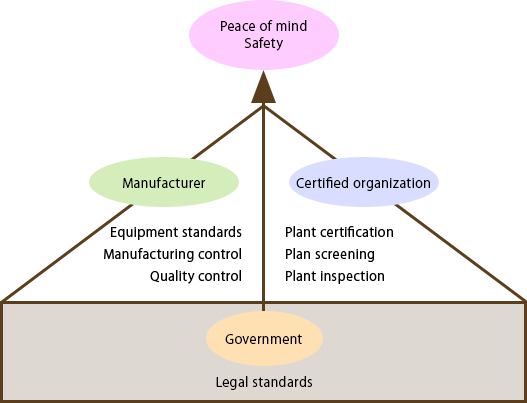

JAS standards are implemented voluntarily. Therefore, acquiring the status of a JAS certified plant shows strong conviction of the manufacturing corporation in terms of providing reliable products to consumers who use edible vegetable oil. At the same, it indicates the confidence of the corporation in terms of supplying outstanding products by fully implementing strict controls based on the three keys explained above.
Plants which are JOPA member corporations that manufacture edible vegetable oil are all JAS certified plants. JAS standards are a system that mainly focuses on household products. Since the inception of the JAS system for edible vegetable oil, JOPA member corporations have focused on eliminating defective products from the market. In addition to household products, member corporations have created a market in which JAS ratings can be acquired for all industrial products used at restaurants and all products used for processing in the food processing industry. Based on these circumstances, the edible vegetable oil the JAS ratings rate is the highest even among the many edible vegetable oil products. In other words, by valuing JAS standards, member corporations have created trust among consumers and the food processing industry.

JAS standards are defined for widely-available products. For edible vegetable oil, ratings are defined for normal salad oil and other oil which is generally used. New oil which is not widely available and unique products created by corporations is not in the category of edible vegetable oil.
For consumers who want to confirm the safety of these oils, concerns can be assuaged by confirming whether the manufacturing corporation has obtained JAS certification for normal edible vegetable oils. Because certified plants apply the same strict production controls to these new products as for JAS products. It can be said that having built trust through JAS is the driving force for creating these oil products. Therefore, although these products do no bear the JAS mark, they contain the strong conviction of being a "symbol of peace of mind" made possible by JAS.

For imported edible vegetable oil, it was possible to affix the JAS ratings if a third-party inspection organization approved by the Japanese government had confirmed that the product satisfied JAS standards. However, this system was revoked in conjunction with legal reform in 2005. Instead, a system was created for acquisition of JAS certification if the importers and plants that manufacture imported oil are recognized as possessing production/quality control that is equivalent to JAS certified plants in Japan. Accordingly, it is possible for imported vegetable oil to acquire JAS ratings. However, until now, there are no foreign corporations that have acquired JAS certification and no imported products that have undergone the JAS rating process. If a label that can be mistaken for JAS products is used for imported products at stores, etc. this may be a violation of the JAS Act.

The JAS Mark shown below can be affixed to products that were manufactured at plants certified based on JAS and that have acquired JAS ratings. This mark is a symbol of safety and peace of mind.
Figure 2: JAS mark
Synthetic salad oil
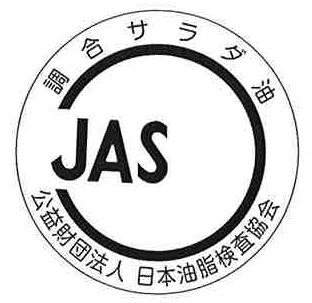
JAPAN INSPECTION INSTITUTE OF FATS & OILS
In the mark, the upper text indicates that the product is salad oil made from a mixture of two or more oils. The bottom text indicates that the product has been confirmed as satisfying JAS standards based on inspection performed by a certification organization. This mark is often displayed on the back or sides of bottles. Please look for this mark when purchasing products.
This section introduces details on JAS ratings for the quality of edible vegetable oil.

Edible vegetable oils which are applicable for JAS standards are 18 types of edible vegetable oils that are widely used by consumers (users) (familiar oils (16 types including soybean oil), products made from a mixture of those familiar oils, and flavored edible oils in which flavor is added to oils). Standards have been established for each type (Table 2). Generally speaking, these standards are revised every five years. Please note that JAS standards for edible vegetable oil were last amended in fiscal 2024.
Table 2: JAS standards for vegetable oil
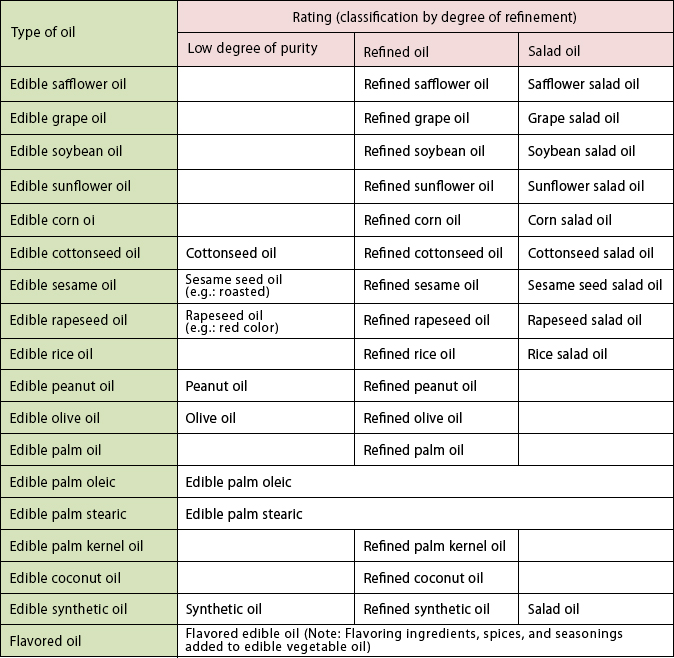
The salad oil rated in Table 2 is salad oil with a high degree of purity from among refined oil. It is silky oil that does not cloud or solidify even at low temperatures. Initially, this oil was developed as edible salad oil by oil-manufacturing companies. When establishing the JAS standard, the name “salad oil” was used as the grade name. Therefore, for vegetable oil for which JAS standards are not defined and for products which do not have JAS ratings, it is not possible to use the name "salad oil" instead of the general product name. This is true even when a similar level of quality exists.

In order to supply quality products which are safe and provide peace of mind, the JAS ratings for edible vegetable oil listed in Table 2 are structured in three aspects (Table 3).
Table 3: JAS ratings structure
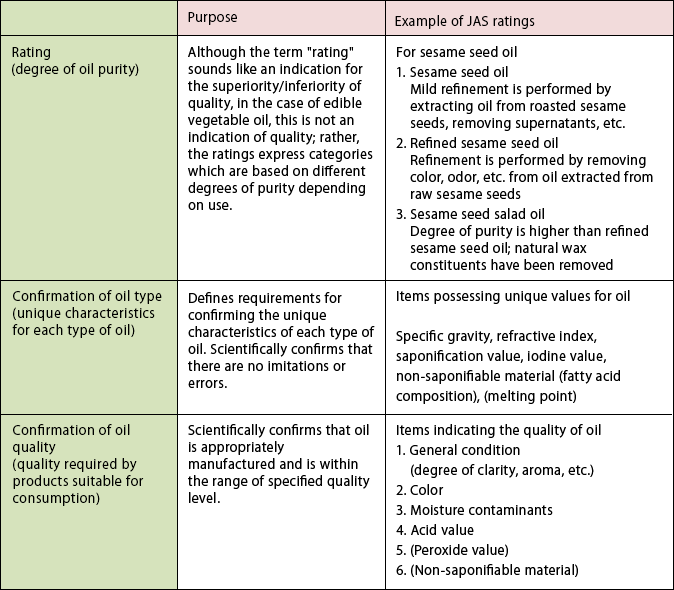

Edible vegetable oil is made from the seeds of plants that are created through the blessings of nature. Oil is extracted from the seeds and refined for consumption to create pure products. Therefore, if oil has been extracted from the same type of ingredients, the composition of the oil and the quality will be within a certain range, although there may be slight differences depending on the type of oil, the production region, and weather conditions during production. The section for confirming oil type in Table 2 defines values for the characteristics of each type of oil within this specified range.
We will now give a brief explanation for the scientific meaning of these ratings.
![]()
By investigating the characteristics for each type of oil listed below in Table 4, it is possible to confirm that the product is edible vegetable oil as listed.
Table 4: Characteristic values of edible vegetable oil for JAS standards
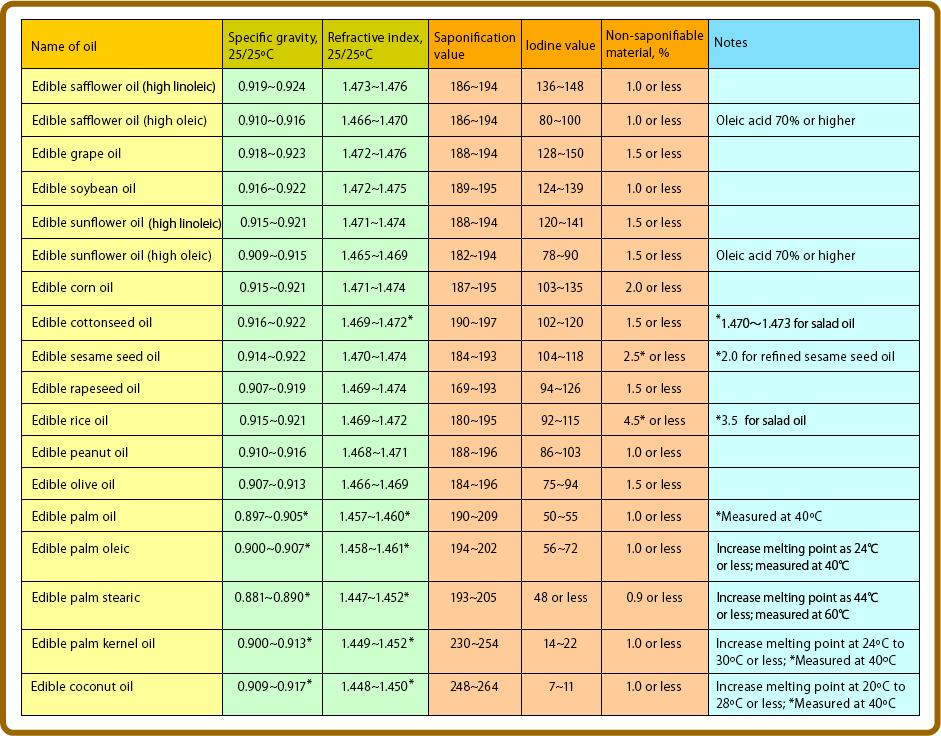
1) The specific gravity and refractive index indicate the length of fatty acids which compose the vegetable oil and the degree of unsaturation.
2) The saponification value indicates the average molecular weight of the vegetable oil.
3) The iodine value indicates the degree of unsaturation for the oil.
4) The non-saponifiable materials indicate the amount of unique components contained in the oil.
5) The fatty acid composition indicates the type and amount (specific gravity) of fatty acids which compose the vegetable oil.
6) The increased melting point indicates the temperature at which solid vegetable oil changes to liquid.
![]()
Product quality can be confirmed through the following inspections which evaluate the degree of purity.
1) The general condition is evaluated by checking the clarity of the oil and conducting visual, olfactory, and taste inspection for the flavor.
2) The color is measured through a combination of yellow and red color. Numerical evaluation is conducted for the unique color of each vegetable oil.
3) The moisture contaminant evaluates the amount of moisture, vegetable oil cloudiness, etc.
4) The oxidation value evaluates the degree of purity by measuring the free fatty acids included in vegetable oil.
5) The peroxide value evaluates the degree of deterioration through oxidation of the vegetable oil.
6) The non-saponifiable material indicates the degree of purity and confirms the vegetable oil.
For edible vegetable oil manufactured in Japan, many corporations other than JOPA member companies have also obtained JAS plant certification. The supply of oil which does not meet JAS standards is almost inconceivable. However, for imported edible vegetable oil, JAS standards are not satisfied due to a lack of understanding for JAS standards. Even so, there are sometimes cases of mistaken labeling. Nevertheless, it is possible to confirm the inconsistencies of labeling by checking numerical values.

With the exception of natural vitamin E (α-tocopherol : contained in large amounts in vegetable oil, this constituent possess anti-oxidant qualities), household products which are designated as edible vegetable oil and which have obtained JAS ratings do not contain any food additives. Therefore, with the exception of natural vitamin E, food additives are not used in edible vegetable oil that has the JAS mark. However, this is not true for products to which JAS standards do not apply. These products may use anti-oxidant agents such as vitamin C. Moreover, imported oil may use anti-oxidant agents and anti-foaming agents that are recognized in the exporting country. Even in cases where labeling is not required by law in the exporting country, labeling in accordance with Japanese laws is necessary when the product is sold in Japan. Unfortunately, there are cases in which labeling is not used correctly. Consequently, the Japan Association for Inspection and Investigation of Foods Including Fats and Oils inspects imported oil as necessary, reports the inspection results to the Japanese government, and requires necessary processing.
Even in the case of edible vegetable oil which has acquired JAS standards, for oil shipped for industrial use, it is permitted to add a very small amount of anti-foaming agent (silicon resin) in order to prevent accidents when making a large amount of fried foods. Please note that products shipped for industrial use (large containers of 4 kilograms or more) are also sold for household use at large wholesale supermarkets.
As discussed, the JAS Act is a law that defines standards for quality, etc. Accordingly, regulations on residual pesticides and poisonous materials for product safety are based on the Food Sanitation Act.
In the case of vegetable, the government inspects for residual pesticides, etc. for imported materials. Only items which meet the allowable standards are permitted to be imported. Therefore, this stage eliminates safety concerns regarding residual pesticides in materials. Furthermore, allowable standards for residual pesticides in imported vegetable oil have been defined, and only products clearing these standards can be imported.
In addition to these incoming checks, in regards to edible vegetable oil to which JAS ratings are applied, each manufacturer sets their own management standards. In addition to in-house inspection, periodic inspection for residual pesticides, etc. is outsourced to a third-party inspection organization such as the Japan Association for Inspection and Investigation of Foods Including Fats and Oils.These are thorough measures for ensuring safety. Moreover, the Association has established a system for conducting inspection for residual pesticides as necessary.
We hope that this section has provided you with an understanding of JAS standards for edible vegetable oil, and of how JOPA member companies have worked to develop related systems.
If you have any further questions regarding JAS for edible vegetable oil, please contact JOPA or the Japan Association for Inspection and Investigation of Foods Including Fats and Oils.
Please visit the following URL for inquiries to the Japan Association for Inspection and Investigation of Foods Including Fats and Oils.
Homepage:http://www.oil-kensa.or.jp/
Although there were formerly multiple laws related to food labeling such as the JAS Act and Food Sanitation Act, a comprehensive Food Labeling Act was enacted in April 2015 combining standards related to food labeling from the Food Sanitation Act, JAS Act, and Health Promotion Act, with the goal of ensuring both safety of food consumption and the opportunity for general consumers to make independent and rational food choices. Based on the food labeling standards, the Food Labeling Act defines required labeling, discretionary labeling, labeling methods, and prohibited label items for each product category (processed food, fresh food, and additives) and business category (food business or other seller), and these provisions came into effect starting in fiscal 2022.
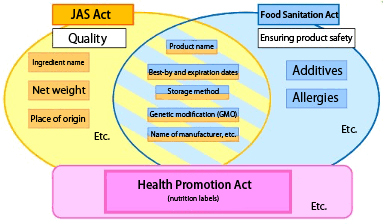
The food labeling standards defined required labeling items such as “product name,” “ingredient names,” “allergen-containing ingredients,” “additives,” “ingredient places of origin,” “information related to genetically modified foods,” “net weight,” “best-by date,” “storage method,” “name and address of food business,” “address of manufacturing or processing site and name of food manufacturer or processor” for general processed foods.
In addition to listing this information in a single, easy-to-see location on the container or packaging, food products are also required to have labels indicating nutrients and calorie content.
Table 5: Edible Vegetable Oil Labeling Information (Sample)
| Labeling item | Explanation of label content |
|---|---|
| Name | Edible xx oil |
| Ingredients | Lists the main ingredients. Vegetable oil is composed of a single pure ingredient. Therefore the ingredient is listed as edible rapeseed oil, edible soybean oil, etc. For mixed oil made from a combination of two or more oils, the constituent ingredients are listed in order of the highest ratio. |
| Additives | All additives are listed in a format such as “substance name.” In addition, additives may also be listed in the ingredients without a separate grouping by indicating a clear separation (such as inserting a “/” symbol). |
| Ingredient places of origin | The place of origin for the ingredients which comprise a large ratio of the product are listed in a format such as “countries of origin in order by weight” or “manufacturing location indication.” In addition, place of origin can also be listed in parentheses () following ingredient names without a separate label grouping. |
| Net weight | Lists the weight of the product. Since the relative density of vegetable oils is strongly affected by temperature, although the product is a liquid, this label item is not volume but weight (in units such as g or kg). |
| Best-by date | Lists the date at which the quality characteristics of the vegetable oil will be lost. This also varies depending on the container. |
| Storage method | Lists the proper storage method (a cool place not exposed to sunlight, cap firmly closed, etc.) in a format such as “Store in a cool, dark place and avoid exposure to direct sunlight.” |
| Food business name and address | Lists the name and address of the food business responsible for the content of the label. |
In addition, although some allergens which can be present in edible vegetable oils include walnuts, peanuts, soybeans, and sesame, since the total protein content of the oils is less than a few ㎍ per g, it is considered unnecessary to list these allergens. However, since these edible vegetable oils are labeled with information such as edible peanut oil, edible soybean oil, and edible sesame oil in their ingredients and other areas, this inevitably serves as an allergy label. Also, since even the latest technology cannot detect any genetic modification such as recombinant DNA in vegetable oils, labeling related to genetically modified ingredients is not required.








